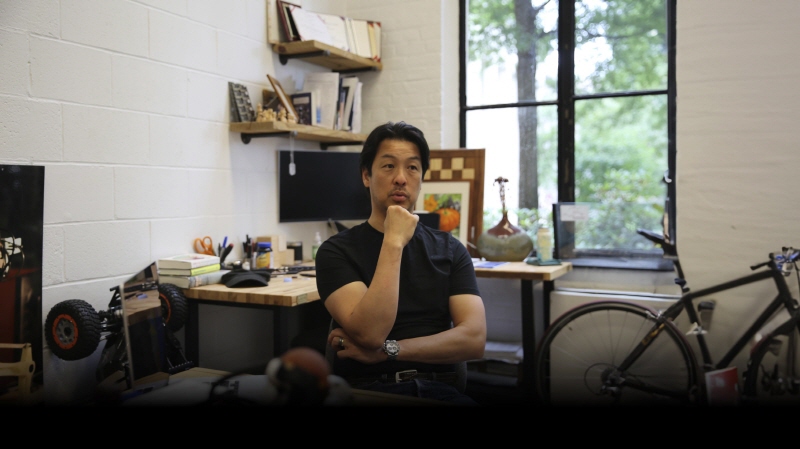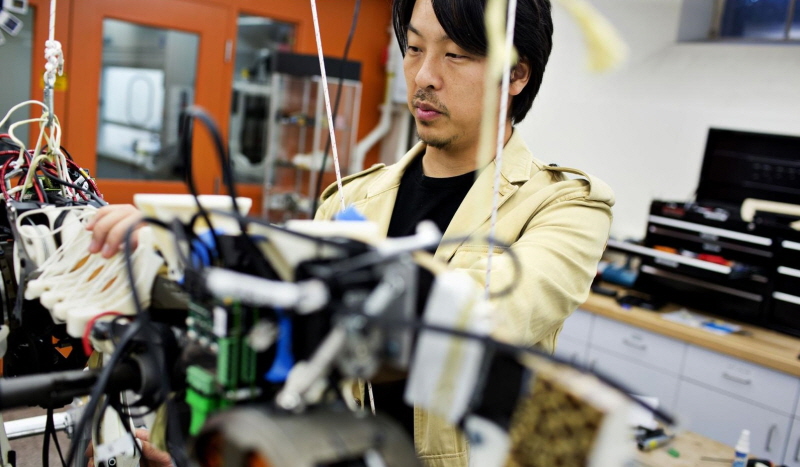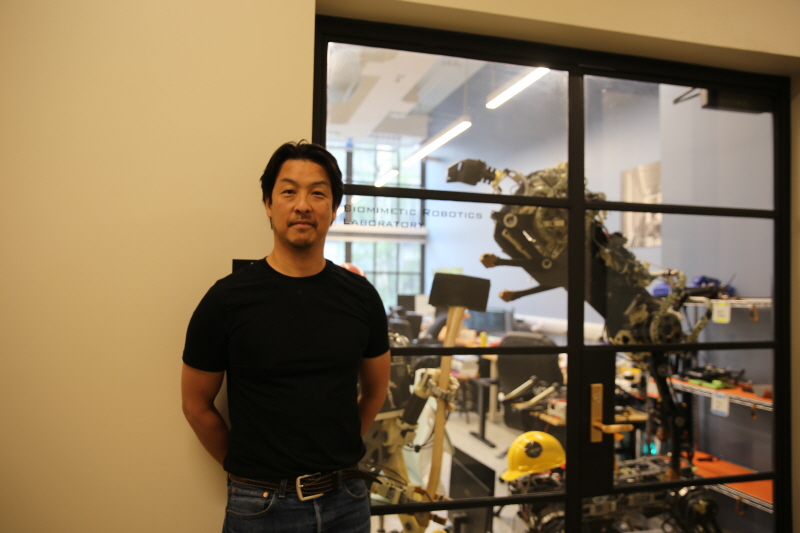“Half of MIT undergraduates major in computer science. This is due to the influence of artificial intelligence (AI). However, it’s hard to say that today’s AI technology is what humanity truly needs. We must not be swayed by superficial phenomena.”
When asked how to raise children in the age of AI, a renowned roboticist and MIT professor Sangbae Kim (49, Mechanical Engineering) offered this perspective. “What humanity needs is not an AI that draws pictures, but an AI that cleans,” he said.
He emphasized that the technology we truly need is one that can free humans from mundane labor. “There’s still a long way to go, but current technology is actually threatening human creativity,” Kim added.

Kim, who graduated from Yonsei University’s Department of Mechanical Engineering, earned his master’s and doctorate degrees from Stanford University. As a student, he invented the “Stickybot” in 2006, a robot capable of climbing walls like a gecko, which was named one of the “Best Inventions” by Time magazine. In 2018, he developed “Cheetah,” a four-legged walking robot, and is currently researching humanoid robots.
The most important factors in creation are thinking skills and creativity. He believes that the internet, social media, and recent generative AI tools like ChatGPT are damaging human thinking and creativity. “The Alpha generation, born after 2010, has brains that don’t think deeply due to these technologies,” he expressed his concern.
Kim’s observations are rooted in personal experience. “My 10-year-old son prefers a tablet PC to toy cars or soccer,” he shared during an interview at his MIT lab in Cambridge, Massachusetts, on July 24 with the JoongAng Ilbo, a leading Korean newspaper affiliated with the Korea Daily.
In an era where YouTube videos entertain and ChatGPT completes homework, students no longer need to memorize basic formulas or understand application methods for exams. Kim criticized this trend, noting, “Children are damaging their brains by acquiring information too easily without deep thinking.” He likened it to a body deteriorating from consuming only candy.
The following is an edited excerpt from the interview:
– What do you mean by a ‘depthless brain’?
“With the advent of the internet, social media, YouTube, and ChatGPT, everything has become too easy. I gave my 10-year-old son a remote-controlled car, but he prefers watching impressive videos of cars on his iPad, finding it more exciting. He rarely plays sports since it requires gathering friends and finding a location, which takes time. Instead, he meets friends quickly online to play computer games. This instant gratification culture makes deep thinking rare, resulting in what I call a ‘candy brain.’ Without depth, creativity also diminishes.”
– What does deep thinking involve?
“It involves freely transitioning between abstraction and concretization. Abstracting and concretizing information is crucial in subjects like math and physics. For example, understanding the physics formula ‘F=ma (force equals mass times acceleration)’ requires grasping the concept abstractly and applying it concretely. However, many students, including those at MIT, avoid this deep thinking because it’s mentally taxing.”

– Isn’t memorizing also a sign of a good brain?
“Students have developed a way of thinking focused on scoring high with minimal effort. This hampers their ability to ‘connect the dots,’ which is crucial for innovation. Even memorization is becoming rare since answers can be quickly found online or via ChatGPT, making traditional study habits obsolete.”
– Is the brain doing less work without memorization?
“Paradoxically, the brain never rests. In the past, I used to reflect on impressive lessons during breaks. Now, students immediately check their smartphones, flooding their brains with new information before they can process previous lessons. This constant input, without proper reflection, damages their cognitive abilities, akin to a body spoiled by candy.”
Achieving a flawless AI is unattainable
Kim warns against viewing AI as an all-powerful machine, noting that just as robots can never become humans, AI cannot fully replace the human brain. “We must first consider whether the current AI is truly the one we need,” he emphasized.
– Don’t you use the internet, YouTube, and ChatGPT?
“I use ChatGPT for theoretical backgrounds in my papers and watch YouTube summary videos on unfamiliar topics. However, I assess these resources with my accumulated knowledge. Children, lacking this foundation, struggle to discern and utilize information correctly. ChatGPT often provides inaccurate answers, especially to complex questions, which is worrying.”
– Can AI ever be perfect?
“As a roboticist, I believe robots can never become humans, and AI can never be perfect. Current generative AI mimics human data patterns without true understanding. It can replicate written patterns but cannot create something entirely new. For instance, ChatGPT cannot write my research proposals because they exist only in my mind and not in any dataset. They may seem creative, but in reality, they are not.”

– Is there a way to use AI effectively despite its flaws?
“Before finding ways to use AI, we should question if it’s the AI we truly need. An artist once said they wished a robot could handle housework so they could focus on painting. Instead, we now see AI painting while humans do housework. AI is taking over creative tasks, leaving essential manual labor unresolved. This doesn’t seem to help humanity in practical terms.”
– Isn’t AI a core technology of the so-called Fourth Industrial Revolution?
“Yes, but the hype around large language models (LLMs) like generative AI will fade in 1 to 2 years. Despite massive investments, returns are not high. Technology trends change quickly, and we should focus on what we genuinely need for living. If cars or doctors disappeared, life would become challenging, if not impossible. But if Facebook, Netflix, or ChatGPT vanished, we could still live as we did before. The problem is students choosing careers based on current trends, with half of MIT undergraduates majoring in computer science. Yet, big tech companies like Meta, Apple, Google, Amazon, and Netflix are laying off developers, which is ironic.”
Maintaining timeless principles
Kim has established three principles: focus, patience, and proactive behavior, to counteract the easy and convenient consumption of information.
– The pace of change is dizzying, with ChatGPT emerging less than two years ago.
“Predicting trends in this era is challenging. However, I believe a brain with depth can handle any change. That’s why I emphasize focus, patience, and proactive behavior to my son. In today’s world, filled with information and stimuli, it’s difficult to focus, have patience, or act proactively. Everything is just a click away.”
– How do you apply these principles?
“I recently taught my son chess. Unlike his relaxed look while watching YouTube, he struggled to decide on moves. I advised him to focus on each move, be patient, and analyze his opponent’s strategy. If confused, he should ask questions, which is proactive behavior. Though he doesn’t fully understand these principles yet, I remind him of them constantly.”

– Do you allow your son to watch YouTube?
“Sadly, no toy can compete with YouTube. I limit it to 30 minutes a day and tell him too much will damage his brain. Over time, he started setting his own limits and alarms, likely to avoid my nagging.”
– As a roboticist in cutting-edge technology, do you have a strategy for raising children?
“My son is only 10, so there’s no need to stress about his future major or career. Who knows how the world will change in the next 10 years? Predicting the future for young children is futile.”
Despite working at the forefront of the Fourth Industrial Revolution, Kim doesn’t blindly trust technology. He lamented the decline in craftsmanship due to the rise of mass production, especially concerning his interest in handmade shoes. While life has become more convenient, creative professions have dwindled. He warned that without cautious engagement with AI, humanity could lose its unique capabilities.
“New technologies will continue to emerge, even faster,” he said. “Remember, no technology should be accepted thoughtlessly, or we risk having depthless brains.”
BY SOYOUNG PARK, YOUNGNAM KIM [park.soyoung0914@joongang.co.kr]




